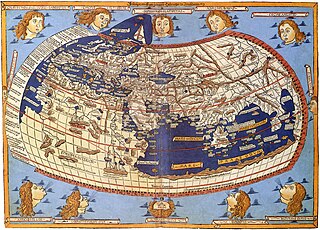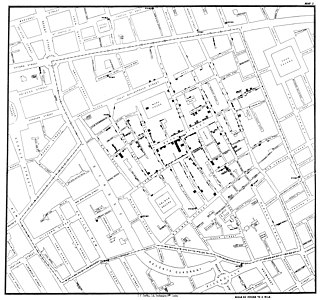Related Research Articles

Cultural imperialism, also called cultural colonialism, comprises the cultural aspects of imperialism. "Imperialism" here refers to the creation and maintenance of unequal relationships between civilizations, favoring a more powerful civilization. Thus, the cultural imperialism is the practice of promoting and imposing a culture, usually that of a politically powerful nation, over a less powerful society; in other words, the cultural hegemony of industrialized or politically and economically influential countries which determine general cultural values and standardize civilizations throughout the world. The term is employed especially in the fields of history, cultural studies, and postcolonial theory. It is usually used in a pejorative sense, often in conjunction with calls to reject such influence. Cultural imperialism may take various forms, such as an attitude, a formal policy, or military action, insofar as it reinforces cultural hegemony.

Cartography is the study and practice of making maps. Combining science, aesthetics, and technique, cartography builds on the premise that reality can be modeled in ways that communicate spatial information effectively.

Human geography or anthropogeography is the branch of geography that deals with humans and their communities, cultures, economies, and interactions with the environment by studying their relations with and across locations. It analyzes patterns of human social interaction, their interactions with the environment, and their spatial interdependencies by application of qualitative and quantitative research methods.

Imperialism is a policy or ideology of extending the rule over peoples and other countries, for extending political and economic access, power and control, through employing hard power especially military force, but also soft power. While related to the concepts of colonialism and empire, imperialism is a distinct concept that can apply to other forms of expansion and many forms of government.

Environmental determinism is the study of how the physical environment predisposes societies and states towards particular development trajectories. Many scholars underscore that this approach supported colonialism and eurocentrism, and devalued human agency in non-Western societies. Jared Diamond, Jeffrey Herbst, Ian Morris, and other social scientists sparked a revival of the theory during the late twentieth and early twenty-first centuries. This "neo-environmental determinism" school of thought examines how geographic and ecological forces influence state-building, economic development, and institutions.

Economic geography is the subfield of human geography which studies economic activity. It can also be considered a subfield or method in economics.

ProQuest LLC is an Ann Arbor, Michigan-based global information-content and technology company, founded in 1938 as University Microfilms by Eugene B. Power. ProQuest provides applications and products for libraries. Its resources and tools support research and learning, publishing and dissemination, and the acquisition, management and discovery of library collections.

In phenomenology, the terms the Other and the Constitutive Other identify the other human being, in his and her differences from the Self, as being a cumulative, constituting factor in the self-image of a person; as acknowledgement of being real; hence, the Other is dissimilar to and the opposite of the Self, of Us, and of the Same. The Constitutive Other is the relation between the personality and the person (body) of a human being; the relation of essential and superficial characteristics of personal identity that corresponds to the relationship between opposite, but correlative, characteristics of the Self, because the difference is inner-difference, within the Self.
The basic concept behind critical geopolitics is that intellectuals of statecraft construct ideas about places; these ideas have influence and reinforce their political behaviors and policy choices, and these ideas affect how we, the people, process our own notions of places and politics.
The cartography of India begins with early charts for navigation and constructional plans for buildings. Indian traditions influenced Tibetan and Islamic traditions, and in turn, were influenced by the British cartographers who solidified modern concepts into India's map making.
Sociology of food is the study of food as it relates to the history, progression, and future development of society. This includes production, preparation, consumption, distribution, conflict, medical application, ritual, spiritual, ethical, and cultural applications, environmental and labor issues.

Geography is a field of science devoted to the study of the lands, features, inhabitants, and phenomena of the Earth and planets. The first person to use the word γεωγραφία was Eratosthenes. Geography is an all-encompassing discipline that seeks an understanding of Earth and its human and natural complexities—not merely where objects are, but also how they have changed and come to be.
Causation is a belief that events occur in predictable ways and that one event leads to another. If the relationship between the variables is non-spurious, the temporal order is in line, and the study is longitudinal, it may be deduced that it is a causal relationship.
Borden D. Dent (1938–2000) was an American geographer and cartographer who served as professor emeritus and chairman of the Department of Geography and Anthropology at Georgia State University. His textbook, Cartography: Thematic Map Design, is one of the seminal texts in the field, and its sixth edition was reissued in 2009.
Dame Sarah Jane Whatmore is a British geographer. She is a professor of environment and public policy at Oxford University. She is a professorial fellow at Keble College, moving from Linacre College in 2012. She was associate head (research) of the Social Sciences Division of the university from 2014 to 2016, and became pro-vice chancellor (education) of Oxford in January 2017. From 2018 she has been head of the Social Sciences Division.

Tropical geography refers to the study of places and people in the tropics. When it first emerged as a discipline, tropical geography was closely associated with imperialism and colonial expansion of the European empires as contributing scholars tended to portray the tropical places as "primitive" and people "uncivilised" and "inferior". A wide range of subjects has been discussed within the sub-field during late 18th to early 20th century including zoology, climatology, geomorphology, economics and cultural studies.

Exploitation colonialism is the national economic policy of conquering a country to exploit its population as labour and its natural resources as raw material. The practice of exploitation colonialism contrasts with settler colonialism, the policy of conquering a country to establish a branch of the metropole (motherland). A reason for which a country might practice exploitation colonialism is the immediate financial gain produced by the low-cost extraction of raw materials by means of a native people, usually administered by a colonial government.
Decoloniality or decolonialism is a school of thought used principally by an emerging Latin American movement which focuses on untangling the production of knowledge from a primarily Eurocentric episteme. It critiques the perceived universality of Western knowledge and the superiority of Western culture. Decolonial perspectives see this hegemony as the basis of Western imperialism.
Sociotechnology is the study of processes on the intersection of society and technology. Vojinović and Abbott define it as "the study of processes in which the social and the technical are indivisibly combined". Sociotechnology is an important part of socio-technical design, which is defined as "designing things that participate in complex systems that have both social and technical aspects".
The Journal of South Asian Development is a peer reviewed journal. It is a forum for discussing all facets of development in South Asia, comprising Afghanistan, Pakistan, India, Sri Lanka, Bangladesh, Nepal, Bhutan and the Maldives, and is published three times in a year by SAGE Publications. The Journal was launched in 2006.
References
- 1 2 3 4 5 Painter, Joe, and Jeffrey, Alex. Political Geography (2nd Edition). London, GBR: SAGE Publications Ltd, 2009. ProQuest ebrary. Web. 28 January 2015. 176
- ↑ Painter, Joe, and Jeffrey, Alex. Political Geography (2nd Edition). London, GBR: SAGE Publications Ltd, 2009. ProQuest ebrary. Web. 28 January 2015. 175-176
- ↑ Painter, Joe, and Jeffrey, Alex. Political Geography (2nd Edition). London, GBR: SAGE Publications Ltd, 2009. ProQuest ebrary. Web. 28 January 2015. 175
- 1 2 3 Shirlow, Peter, Gallaher, Carolyn, and Gilmartin, Mary. Key Concepts in Political Geography. London, GBR: SAGE Publications Ltd. (UK), 2009. ProQuest ebrary. Web. 28 January 2015. 116
- ↑ Painter, Joe, and Jeffrey, Alex. Political Geography (2nd Edition). London, GBR: SAGE Publications Ltd, 2009. ProQuest ebrary. Web. 28 January 2015. 177-178